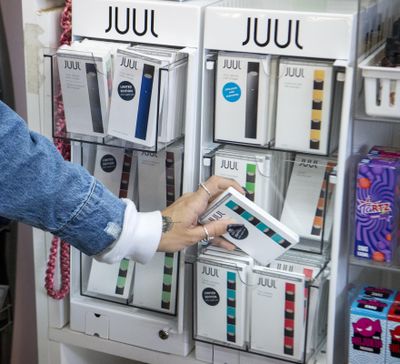Vaping industry escapes legislative ban, but coronavirus poses new threat to users

OLYMPIA – After Washington’s emergency ban on flavored vape products expired in February, the Legislature failed to pass a more permanent ban, and vaping stores have again begun selling their products.
Senate Bill 6254 started as a sweeping ban on all flavored vape products but was stripped down to a moderate approach, banning disposable flavored products and products containing vitamin E acetate – the chemical linked to vape-related illnesses. But even that modest measure couldn’t pass the Legislature in the session that ended this month.
But now, as the novel coronavirus pandemic is sweeping the world and exacting particular devastation in Washington, the use of vaping products has raised new concern.
While health experts say younger people are at significantly lower risk of developing extreme symptoms or dying from the disease, they also say that those with underlying lung and respiratory issues – which smoking and vaping can cause – are more at-risk.
According to Dr. Kathy Lofy, the chief science officer at the Washington State Department of Health, more evidence is emerging about how vapor products can interfere with normal lung function. The Centers for Disease Control and Prevention (CDC) has also warned that vape products can contain “flavorings that have been linked to lung disease.”
Vaping, or the use of e-cigarettes, is quite popular with people 30 and under and those trying to quit smoking. But both groups, health officials say, may have physical conditions from such activity that, should they contract the coronavirus, would make their status even more critical.
“Because it attacks the lungs, the coronavirus that causes COVID-19 could be an especially serious threat to those who smoke tobacco or marijuana or who vape,” according to Dr. Nora Volkow, director of the National Institute on Drug Abuse, on her blog. “Vaping, like smoking, may also harm lung health. Whether it can lead to COPD is still unknown, but emerging evidence suggests that exposure to aerosols from e-cigarettes harms the cells of the lung and diminishes the ability to respond to infection.”
But rather than curbing their vape habits since the outbreak, some individuals are stocking up.
“They’re worried about us shutting down,” said Sage Prengel, who works at South Sound Vapor Lounge in Olympia. Gov. Jay Inslee issued an order last week that only essential business are allow to operate during the pandemic. Businesses that sell vaping, tobacco and cannabis products are considered essential under Inslee’s order.
Prengel said most of his customers aren’t concerned about how vaping may make them more susceptible to the virus.
Long before the pandemic, there was a national debate as to the merits of vaping, a debate that landed in Olympia.
“As an ex-smoker, and I proudly claim to be that, vaping was the tool that probably saved my life,” said Sen. Bob Hasegawa, D-Seattle, who voted against the legislation.
But state health officials say there isn’t solid evidence that vaping is an effective method to quit smoking, and some lawmakers argue that the crisis of youth vaping outweighs potential benefits.
“This is about the youth and preventing millions of people from becoming new nicotine addicts” said Sen. Patty Kuderer, D-Bellevue, who sponsored the bill.
In 2019, 1 in 4 high school students vaped, and high school and middle school use has been increasing since 2017, according to the CDC and the Federal Drug Administration. The agencies have also said that vape products with high levels of nicotine can impact brain development and make youths more likely to start smoking cigarettes.
But now, with the coronavirus claiming 195 lives and infecting nearly 4,900 people in Washington as of Sunday, some vapers are worried.
One 22-year-old Tacoma resident, who did not want to be identified, said he’s not concerned about vaping during the pandemic, and that he continues to vape and share his device with friends.
“From personal use, and from seeing my other friends do it, we’ve never really had any issues,” he said. “We normally don’t cough after vaping.”
Meanwhile, with no new major restrictions, vape stores across the state are breathing a sigh of relief.
“FLAVORED E-JUICE IS BACK,” reads a sign outside Smokin Js in Olympia.
Jay Fratt, the store’s owner, said vape products make up 15% to 20% of his inventory. Fratt started selling flavored vaping products once the state’s emergency ban was lifted but kept a close eye on SB 6254.
“We survived the vape ban, and I thought that was the end of it,” Fratt said.
Indeed, Kuderer said she plans on giving the vape ban another shot next year, with many of her Democratic counterparts backing her up.
But Fratt said the vaping epidemic is a result of youths not fully understanding the consequences of vaping. And education should be the solution, he argued, rather than “attacking mom-and-pop industries.”
Kuderer sees it differently.
“I do think if you’re selling a product that we discover is harmful to our citizens, maybe it’s time to find something else to sell,” she said.